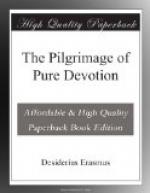that. Me. And if any haue forty byfore dynar,
may he axe other forty at after souper, is there any
thynge left than to gyue him? Ogy. Ye, & if
thou aske it ten tymes in one howre. Me. I
wold || C iiij.|| to God that I had suche a pardon
bagge, I wold aske but .iij. grotes, and if thay wold
flowe so faste. Ogy. Ye but you desyre to be
to ryche, if that you myght for wyshynge, but I wyl
turne to my tale, but there was some good holy man
whiche dyd gyue this argumente of holynes to that
mylke, and sayd that our Ladyes mylke whiche is in
many other places, is precyous & to be worshipyd but
thys is moche more precyous, & to be honoryd, bycause
the other was shauen of stones, but this is the same
that came out of the virgynes brest. Me. How
kno you that? Ogy. The mayd of Costantynople,
which dyd gyue it, dyd saye so. Me. Perauenture
saynt Barnard dyd gyue it to her. Ogy. So I
suppose. For wha he was an old man, yet he was
so happy that he sukkyd of ye same mylke, that Iesus
hymselffe sukkyd apon. Me. But I maruayle why
he was || rather callyd a hony sukker than a mylke
sukker. But how is it callyd oure ladyes mylke
that came neuer owt of her breste? Ogy. Yes
it came owt at her breste, but perauenture it light
apon the stone that he whiche sukkyd knelyd apon,
and ther was receyuyd, and so is encreasyd, & by ye
wyll of god is so multyplyed. Me. It is wel
sayd. Ogy. Whan we had sene all thys, whyle
that we were walkynge vpe & downe, if that any thynge
of valure were offeryd, so that anybody were present
to see thaym ye Sextens mayd great haste for feare
of crafty couayece, lokynge apo thaym as thay wold
eate thaym. Thay poynte at hym with there fynger,
thay runne, thay goo, thay come, thay bekke one to
an other, as tho thay wold speake to thaym that stand
by if thay durste haue be bold. Mene. Were you
afrayd of nothynge there? Ogy. Yis I dyd loke
|| C v.|| apo hym, lawghynge as who shold saye I wold
moue him to speake to me, at laste he cam to me, and
axid me what was my name, I told him. He axid
me if yt were nat I that dyd hange vpe there a table
of my vowe writen in Hebrew, within .ij. yere before.
I confessid that it was ye same. Me. Ca you
wryte hebrewe? Ogygy. No but all that thay
canat vnderstond, thay suppose to be Hebrewe.
And than (I suppose he was send for) came the posterior
pryor. Me. What name of worshipe is that?
Haue thay nat an abbate? Ogy. No Me.
Why so? Ogy. For thay cannat speake Hebrew.
Me. Haue thay nat a Bishope? Ogy. No.
Me. What is ye cause? Ogy. For oure
lady is nat as yet so ryche, that she is able to bye
a crosse, & a mytre, whiche be so deare, Me.
Yet at least haue thay nat a presedente? Ogy.
No veryly. What lettythe thaym? Ogy. That
is a name || of dygnyte and nat of relygyo. And
also for that cause suche abbayes of Chanones, doo
nat receyue the name of an abbate, thay doo call thaym




